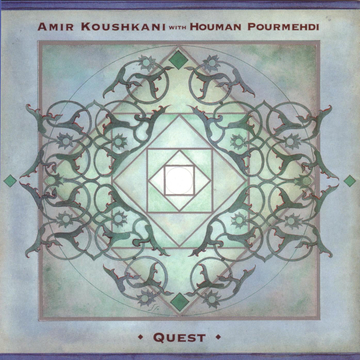Amir Koushkani
Quest
SGL 2402-2“Extradordinary…It’s sublime music brimming with virtuosity and beauty…expressive and heartfelt.”
— Chris Wong, Vancouver Courier
Amir Koushkani and his percussionist partner Houman Poumehdi are part of the young generation of Iranians who have brought their classical tradition of instrumental performance and song to the west, and who are also making contemporary music that links with other cultures and styles. Seasoned ears may recognize certain influences here from Indian classical music, Turkish music, Spanish flamenco, etc. (“Amazed” for example is in 10/8, an Indian rhythm), although the basic forms of the pieces and for the most part the way they are elaborated is in accordance with Persian musical practice. Koushkani’s instrument, the long-necked six-stringed lute called tar, is in his hands a subtle tool for evoking shifting moods of hope, dismay, grief and joy — feelings also strongly expressed in his singing. Employing the tombak (goblet drum) or the daf (frame drum), Pourmehdi’s percussion threads itself though Amir’s melodic lines and embellishments as together they realize a musical quest for enlightenment. As Amir comments about the process of recording, “I made the body, but the soul of the body we made in the moment.”
Sufism — a mystical tradition whose roots go back more than a thousand years in the cultures and arts of the middle east — is Amir’s inspiration for this suite of pieces, and the three Farsi poems he has set to music speak of the paradoxes and mysteries of being that Sufism approaches through its devotional ceremonies and practices. For Sufis the ultimate goal is to lose one’s separate, ego-identified self in the love of God, and intoxication through wine or the contemplation of earthly beauty has been another way to this ecstatic state. In extemporized music-making such as this, even as disciplined and highly structured as it is, there sometimes comes a point when the performers are immersed so deeply that the music starts flowing through them. Jazz improvisors often comment on a similar kind of transcendental experience. Listeners too may find that Amir’s music opens a door they perhaps never knew was there.
Amir Koushkani was born in Tehran in 1968 and from the age of 13 studied tar at the National Iranian Radio and Television’s Centre for Preservation and Propagation of National Music, completing a four-year apprenticeship in the performance of tar and setar (a four-stringed Persian lute) in 1984. Subsequently he became an instructor of tar at the Centre. In 1991 he emigrated to Canada, and since then he has concertized in Canada, the U.S. and Europe, including WOMAD (Toronto, 1991) and the Sufi Music Village Festival (London, 1997), as well as creating and performing the music for two plays on Sufi themes in Vancouver, where he currently lives and teaches. This is Amir’s first CD.
Houman Pourmehdi was born in Tehran in 1965. He studied tombak at the Centre for Preservation and Propagation of National Music, and daf with Sufi order virtuosos; he has also studied and performs on the ney (end-blown flute). In 1988 he came to the U.S.; he founded the Society for the Advancement and Preservation of Traditional Persian Music in Chicago and has concertized widely, performing at such festivals as Parliament of the World’s Religions (Chicago, 1993), Sufi Music of the World (Los Angeles, 1995), and Verden I Norden (Norway, 1996). He appears on two CDs: Mohammad Reza Lotfi, The Art of Improvisation in Chaharga (1991) and Sufi Music of Iran, Volume I (1996). Houman currently lives and teaches in Los Angeles where he also pursues his own studies in world music.
“Rapturous…Koushkani is a virtuouso [and] the presentation is visceral and immediate. Part of that has to do with the fact that Koushkani sings, and his throaty voice has the same kind of passionate intensity that you might find in the blues…But don’t let the relative familiarity of the sound take away from its emotional impact…Koushkani seeks and finds the divine in sound…Like their many exiled peers, these [Persian] musicians show how cosmopolitan their culture really is — not by adopting the trappings of western pop, but by reminding us of their country’s historic role as a centre of learning and art.” — Alexander Varty, The Georgia Straight
**** “Amir Koushkani is essentially a traditionalist, and he is a virtuoso on the tar, a Persian lute…but…it would be inaccurate to describe Quest as the work of a hardcore purist…A very fresh-sounding and rewarding take on a musical idiom that has been around for centuries.” — Alex Henderson, Allmusic.com
